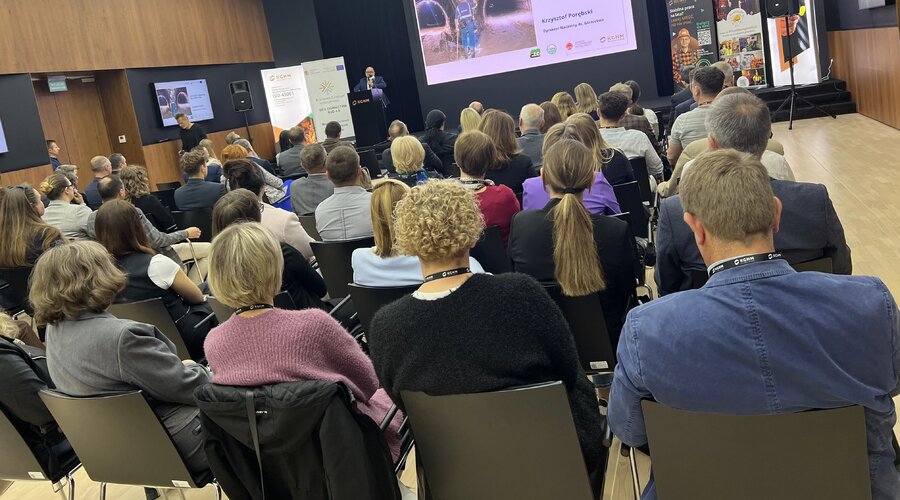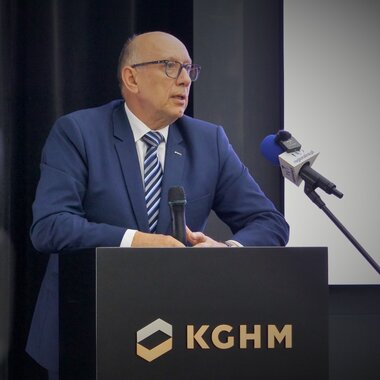Mining of the future as the subject of a scientific conference organised by KGHM Polska Miedź S.A.
The first conference entitled ‘Mining of the future - an open day for the metal ore mining industry’, organised by KGHM as part of its partnership with the Industry Skills Centre Ore Mining 4.0 project is behind us. The event, held in Lubin, brought together dozens of representatives of universities and secondary schools, university students, as well as participants from companies operating in the mining industry.
The conference programme focused on the latest developments in the digitalisation of mining, and the future prospects of, and challenges to, KGHM’s operations. The participants had the opportunity to see how the technical capabilities of mine rescue services have changed over the years.
‘Today’s conference is a response to the changing times and therefore the mining industry in which we operate. The miner of the future is not the same miner who started building mines in the Copper Belt. We certainly expect more from our current and future employees. We expect specialist staff and teams formed for specific tasks. That is why KGHM gets involved in vocational education, e.g. in Lubin we participate in the establishment of the Industry Skills Centre, but we also sponsor schools that provide education in technical occupations’, said Zbigniew Bryja, the Deputy CEO of KGHM Polska Miedź S.A. for Development.
The promotion of technical education and the exchange of knowledge and experience among education and training institutions, employers and industry workers are the main tasks of the recently introduced Industry Skills Centres (ISC) in the Polish education system. The conference, organised by KGHM, was another event accompanying the establishment of the Lubin ISC. The institution, managed by the Copper Personnel Training Centre in Lubin, implements the concept of a centre of vocational excellence (CoVE) for underground mining, metal ore and mineral processing.
‘Mining of the future is all about the challenges our engineers will face in extracting raw materials under increasingly difficult conditions. On the other hand, the development of new technologies, artificial intelligence, and humanoid robots is making workers fear that they will no longer be needed. I am glad that the role of preparation of the conference was assigned precisely to the human resources department, because we want it to be heard that increased mechanisation and progress will invariably continue to require the involvement of people. The only thing that will definitely change is the competencies we will need’, said Magdalena Lipińska, the general manager for human resources management at KGHM, at the opening of the event.
Representatives of KGHM, but also scientists from universities with which the company cooperates, took the role of speakers at the conference. Krzysztof Porębski the, general manager for mining at KGHM, spoke about the demand and need for copper in the coming years. Professor Wojciech Milczarek from the Wrocław University of Technology introduced the participants to the achievements in the field of geoinformatics in the broadest sense, which is a new specialisation of the university’s Faculty of Geoengineering, Mining and Geology. Mariusz Rosik, who represented the Jan Wyżykowski School in Polkowice and who is also an employee of KGHM, spoke about the future of mine rescue operations.
A special guest at the conference was Professor Maciej Mulak from the Wrocław University of Technology, who runs his own ‘Physics without boredom’ channel on a social networking site, where he explains the physical phenomena taking place in the world around us in an accessible way.
The event is the first of two conferences that KGHM is planning to organise to share knowledge and experience while promoting vocational education among young people. Since 2018, the company has been running the ‘Competent in the Mining and Smelting Industry’ educational programme that currently covers 10 schools from the Dolnośląskie and Lubuskie provinces that provide education in mining-related vocations.











